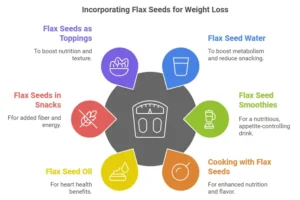Best Way to Eat Flax Seeds for Weight Loss

Flax seeds have been hailed as a superfood for their rich nutritional profile and numerous health benefits. Incorporating flax seeds into your diet can be a game-changer if you want to lose weight. This article will explore the best way to eat flax seeds for weight loss, backed by science and practical tips.
How Flax Seeds Support Weight Loss
Incorporating flax seeds into your diet can offer multiple health benefits, particularly relevant to weight loss. These benefits include digestive health, appetite control, and metabolism-boosting.
- Digestive Health: A healthy digestive system is crucial for effective weight loss. Flax seed fiber supports the growth of healthy gut bacteria, which are essential for digestion and overall wellness.
- Appetite Control: The soluble fiber in flax seeds forms a gel-like material in your stomach after absorbing water. This process slows digestion, making you feel full for a longer period. Feeling full can help reduce overall calorie intake by curbing the urge to snack between meals. By incorporating flax seeds into your diet, you can manage your appetite more effectively which is a key factor in weight loss.
- Metabolism Boost: A faster metabolism helps your body burn calories more efficiently, even at rest. Consuming flax seeds can help increase your overall energy expenditure. The nutrients in flax seeds support the body’s ability to convert food into energy rather than storing it as fat. This can help you achieve a more efficient calorie-burning process, aiding in weight loss.
- Also, explore High Fiber Foods for Weight Loss.
Nutritional Benefits of Flax Seeds
Flax seeds are tiny powerhouses packed with essential nutrients, making them an excellent addition to any weight loss regimen. Here’s a closer look at their nutritional benefits:
Fiber
A study published in Appetite found that flaxseeds can help reduce hunger and food intake due to their high fiber content.
- The fiber in flax seeds increases feelings of fullness, which can lead to a lower calorie intake and support weight loss efforts.
- Flax seeds are rich in soluble fiber, which dissolves in water to form a gel-like substance. This fiber slows digestion, helping you feel fuller for longer periods and reducing the urge to snack between meals.
- They also contain insoluble fiber, which adds bulk to the stool and promotes regular bowel movements, aiding overall digestive health.
Omega-3 Fatty Acids
- Flax seeds are one of the best plant-based sources of omega-3 fatty acids, particularly alpha-linolenic acid (ALA). ALA is essential for reducing inflammation, and benefiting heart health and overall metabolism.
- Consuming omega-3s helps balance the ratio of omega-6 to omega-3 fatty acids in the diet, which is crucial for reducing chronic inflammation associated with obesity and metabolic disorders.
A study showed that the ALA in flax seeds might increase fat oxidation, which means your body burns more fat for energy. Those trying to reduce weight and enhance their body composition may find this helpful.
Lignans
- Flax seeds contain lignans, which are plant compounds with antioxidant properties.
- Lignans help protect the body against free radicals and oxidative stress.
- Lignans also have phytoestrogen properties, which can help balance hormones, particularly in women. Because hormone balance is essential for both metabolism and fat storage, this may aid in managing weight.
Best Way to Eat Flax Seeds for Weight Loss

Flax seeds can be easily integrated into various meals and beverages, making them a versatile addition to your weight loss plan. Here are some of the best ways to incorporate flax seeds into your diet:
Flax Seed Water
- Mix 1 tablespoon of ground flax seeds in a glass of water. Let it sit for ten minutes before drinking.
- Drinking flaxseed water in the morning on an empty stomach can help kickstart your metabolism.
- It helps keep you full until your next meal, reducing the urge to snack.
- Add a squeeze of lemon for extra flavor and a boost of vitamin C.
Flax Seed Smoothies
- Blend 1 tablespoon of ground flax seeds with your favorite fruits (such as berries or banana), 1 cup of milk or a milk alternative, and a handful of spinach.
- Smoothies are a convenient and delicious way to consume flax seeds. They provide a nutrient-rich meal or snack that can help control your appetite.
- Experiment with different fruits and vegetables to keep your smoothies interesting and nutritious.
Cooking with Flax Seeds and Flax Seed Powder
- Add ground flax seeds or flax seed powder to your oatmeal, yogurt, or baked goods like muffins and bread.
- Stir in 1 tablespoon of ground flax seeds to your morning oatmeal.
- Mix ground flax seeds into yogurt with some fresh fruit.
- Replace some flour with flax seed powder in your favorite recipes.
- Always use ground flax seeds for better nutrient absorption since whole seeds can pass through your digestive system undigested.
Flax Seed Oil
- Flax seed oil is rich in omega-3 fatty acids, which are beneficial for heart health and reducing inflammation.
- Use flax seed oil as a base for salad dressings or drizzle over cold dishes.
- Avoid cooking with flax seed oil as high heat can destroy its beneficial properties.
- Mix flax seed oil with lemon juice, Dijon mustard, and honey for a healthy salad dressing.
Flax Seeds in Snacks
Flax seeds are versatile and can be easily incorporated into various snacks, enhancing nutrition and flavor. Here are ideas for adding flax seeds to popular snacks:
Energy Balls:
- Combine dates, nuts (such as almonds or cashews), cocoa powder, and ground flax seeds in a food processor. Roll into small balls and refrigerate.
- Flax seeds add fiber and omega-3 fatty acids to energy balls, providing a nutritious energy boost.
Granola Bars:
- Mix oats, honey or maple syrup, nuts, dried fruits, and ground flax seeds. Press into a baking dish, bake until golden brown, and cut into bars after cooling.
- Flax seeds add a crunchy texture and nutritional value to granola bars, making them a satisfying and healthy snack.
Mixed Nuts:
- Toss mixed nuts (like almonds, walnuts, and pecans) with a drizzle of honey or maple syrup and sprinkle with ground flax seeds.
- Adding flax seeds to mixed nuts increases their fiber content and provides a subtle nutty flavor.
Flax Seeds as a Topping
In various cuisines, flax seeds can be added as a topping to enhance the nutritional profile and texture. Here are creative ways to incorporate flax seeds into meals:
Salads:
- Sprinkle whole or ground flax seeds over salads for added crunch and a boost of omega-3 fatty acids.
- Flax seeds add texture and nutritional value to salads without altering their flavor profile significantly.
Soups:
- Stir ground flax seeds into soups just before serving to thicken and enhance nutritional content.
- Flax seeds contribute fiber and a slightly nutty flavor to soups, making them more satisfying and nutritious.
Cereals:
- Mix ground flax seeds into your morning cereal or oatmeal for extra fiber and omega-3s.
- Incorporating flax seeds into cereals boosts their nutritional value and helps keep you fuller longer.
Flax Seed in Baking
Flax seeds can be a nutritional alternative in baking recipes, with additional health advantages.
Here’s how to incorporate flax seeds into your baking:
Egg Substitute:
- Mix 1 tablespoon of ground flax seeds with 3 tablespoons of water to replace one egg in baking recipes.
- Flax seeds act as a binding agent and add moisture to baked goods, making them suitable for vegan or egg-free diets.
Flour Substitute:
- Replace a portion of the flour in muffins, bread, or pancakes with ground flax seeds (usually up to 25%).
- Using flax seeds as a flour substitute increases fiber content and adds a nutty flavor to baked goods, improving their nutritional profile.
Coating or Topping:
- Roll chicken or fish in ground flax seeds before baking or use them as a topping for breaded dishes.
- Flax seeds add a crunchy texture and boost omega-3 fatty acids in savory baked dishes.
By incorporating these methods into your daily routine, you can enjoy the numerous health benefits of flax seeds while supporting your weight loss goals. Whether you drink flax seed water, enjoy flax seed smoothies, cook with flax seeds, or use flax seed oil, these tiny seeds can make a big difference in your diet.
Best Time to Eat Flax Seeds for Weight Loss

To maximize the benefits of flax seeds for weight loss, the best time to consume them is in the morning. Here’s why:
Morning:
- Drinking flax seed water or adding ground flax seeds to your morning smoothie can help jumpstart your metabolism.
- Consuming flax seeds in the morning helps keep you full until your next meal, reducing the urge to snack and aiding in appetite control.
- Incorporating flax seeds into your breakfast routine can set a positive tone for the rest of your day, making it easier to manage hunger and support your weight loss efforts.
Also read: Best Morning Routine for Weight Loss.
Pre-meal:
- Consuming flax seeds before meals can help control appetite and prevent overeating.
- The fiber in flax seeds absorbs water and swells in your stomach, promoting a feeling of fullness. This can lead to reduced calorie intake during meals.
Bedtime:
- Some people find that eating flax seeds before bed helps digestion and keeps them satisfied overnight.
- The fiber in flax seeds supports healthy digestion and can prevent late-night snacking by making you feel fuller for longer periods.
You can better support your weight loss goals and overall health by strategically timing your flax seed consumption.
Precautions and Considerations
Although flax seeds are full of health benefits, it’s crucial to be aware of potential side effects and special health precautions. Here are some key points to keep in mind:
Side Effects and Allergies
- Some individuals may experience allergic reactions to flax seeds. Itching, swelling, and breathing difficulties are some of the symptoms.
- Stop using flax seeds immediately and consult a healthcare provider if you notice any adverse effects.
Health Conditions
- The hormonal effects of lignans in flax seeds might not suit everyone.
- If you have conditions such as breast cancer or endometriosis, talk to your doctor before adding flax seeds to your diet.
- Flax seeds contain phytoestrogens, which can affect hormone levels.
- Flax seeds can lower blood sugar levels but if you have diabetes, monitor your blood sugar closely.
- Consult your doctor to ensure flax seeds are safe for you.
Dosage and Moderation
- Begin with a small amount, such as 1 teaspoon daily, to allow your body to adjust to the high fiber content.
- Gradually increase your intake to 1-2 tablespoons per day. This reduces the chances of stomach upset and helps your digestive system to adapt.
- Drink plenty of water when consuming flax seeds to help with digestion and prevent constipation. The fiber in flax seeds absorbs water, so staying hydrated is crucial.
By considering these precautions and monitoring your body’s response, you can safely enjoy the benefits of flax seeds as part of your weight loss diet.
Conclusion
Flax seeds are a powerful addition to your weight loss diet, offering benefits. Easy to incorporate into meals and snacks, these tiny seeds can impact your health and weight loss goals.
Start adding flax seeds to your daily routine today! Experiment with flax seed water, smoothies, or baked goods, and share your experiences in the comments below. Embrace the benefits of flax seeds and take a step closer to achieving your weight loss goals.
FAQs
How much flax seed should I consume daily for weight loss?
Start with 1 teaspoon daily and gradually increase to 1-2 tablespoons. This helps your body adjust to the high fiber content.
Can I eat whole flax seeds?
It’s better to consume ground flax seeds as they are easier to digest and allow for better nutrient absorption. Whole flax seeds may pass through your digestive system undigested.
What is the best time to eat flax seeds for weight loss?
Consuming flax seed water in the morning on an empty stomach can help kickstart your metabolism and keep you full until your next meal.
Are there any side effects of consuming flax seeds?
Some individuals may have stomach problems or allergic reactions. Stop using flax seeds and consult a healthcare provider if you notice any adverse effects.
Can pregnant or breastfeeding women consume flax seeds?
Pregnant and breastfeeding women should consult their healthcare provider before consuming flax seeds due to their hormonal effects.
How can I incorporate flax seeds into my diet?
You can drink flax seed water, add ground flax seeds to smoothies, stir them into oatmeal or yogurt, and use flax seed oil in salad dressings.
Can flax seeds help with hormone-sensitive conditions?
Flax seeds contain phytoestrogens, which can affect hormone levels. If you have conditions like breast cancer or endometriosis, consult your doctor before adding flax seeds to your diet.
Do flax seeds interact with medications?
Flax seeds can lower blood sugar levels, so if you are on diabetes medication or other medications, consult your healthcare provider to avoid potential interactions.
Is it necessary to drink extra water when consuming flax seeds?
Yes, drinking plenty of water is important when consuming flax seeds, to aid digestion and prevent constipation.






